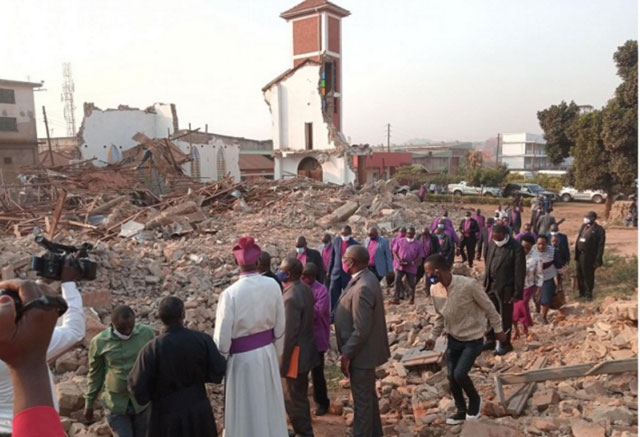
Kampala, Uganda | THE INDEPENDENT | The Anti-Corruption Court in Kampala has rejected a set of documents submitted as part of the evidence in the infamous Ndeeba church demolition case.
The prosecution had presented Pamela Akora, the former acting supervisor of the technical review team at Kampala Capital City Authority, as the state witness to among other reasons, present to court the irregularities in the process that finally led to the demolition of the church.
Just like two previous witnesses, Akora also noted that the development application by Dodoviko Mwanje, the key suspect in the matter had followed the right procedure. She however noted that the developer lied about the existing use of land, and never mentioned that there was a church structure on the site.
She further pointed out that at the time of demolishing the church, KCCA had halted the issuance of the development and related permits. Her statement was based on a number of meetings that guided how development plans and related permits were to be handled in accordance with the Building Control Act and its new regulation.
Prior to this submission, the prosecution had consistently maintained that the demolition permits had been illegally issued by Ivan Katongole, the former acting Director of Physical Planning, who allegedly conspired with the developer-Dodovico Mwanje.
With the witness submission, the prosecution requested to turn in the minutes of the said meeting which was held between June and July 2020, as evidence to the court. However, Ambrose Tebyasa, one of the defence attorneys, raised an objection pointing out that the material presented in court was entirely different from what the state had provided to them during the pre-trial disclosure.
“What has been presented is totally different from what we have,” Tebyasa said, pointing out the differences identified in the sets of minutes for the meeting that sat on July 5, 2020. For instance, one set of the presented meeting minutes had signatures that did not appear on the document that had been disclosed.
Tebyasa also remarked that a different document appeared to be a scanned copy and questioned what might have happened to the original document. More specifically, he questioned how the court could determine that the witness was the secretary of one of the meetings held on July 2 and July 5, 2020, if the document submitted as the evidence doesn’t have her signature.
Max Mutabingwa, another defence lawyer, also wondered why the certified copies of the meeting minutes for the Directorate of Physical Planning were issued by the director entering the department. When the documents in question were submitted to Chief Magistrate Joan Aciro, she concurred that two sets of minutes had problems that raised doubts about their authenticity.
“Just a physical examination brings this out, the document disclosed to the defence is different from the document presented. The minutes of July 2, 2020, have issues, all pages through the document are in original form but the last page is a scanned copy, why?” She pointed out that one of the pages on the document in question was unique from others as it had a different font size and texture of letters.
The magistrate also ruled that since all minutes, and particularly those of July 5, 2020, did not have the witness’ signature, it was challenging to accept that the witness could identify them.
“Since the document was typed, the only way she can identify it is by her signature. How can we verify that it wasn’t authored by someone else if there is no signature? If the document was handwritten, she could recognize it by her handwriting, which is not the case,” she added before rejecting the documents as evidence.
After missing the chance to introduce this crucial piece of evidence, the prosecution took out a second strategy from the bag requesting that the case be adjourned so that they make a fresh disclosure of the authentic minutes from the July 5, 2020 meeting to resolve the standoff.
Defence lawyers however opposed this action on grounds that it might be prejudicial to their clients. “The accused persons were charged in October 2020, and the state made its disclosure one year and a month later, in September 2021. We are led to conclude that they are planning to fabricate evidence if they were unable to obtain the original within that time,” Tebyasa said, praying that the court should not be a venue for the state to fabricate evidence.
The magistrate later ruled that the prosecution can prepare and present the authentic minutes of the July 5, 2020 meeting, but also said that because Akora’s signature is not the document, she cannot be called back to testify. She later adjourned the matter to January 30, 2023..
*****
URN
The post Court questions authenticity of state evidence in Ndeeba church case appeared first on The Independent Uganda:.
from The Independent Uganda: https://ift.tt/ZcO6Cyl
0 Comments